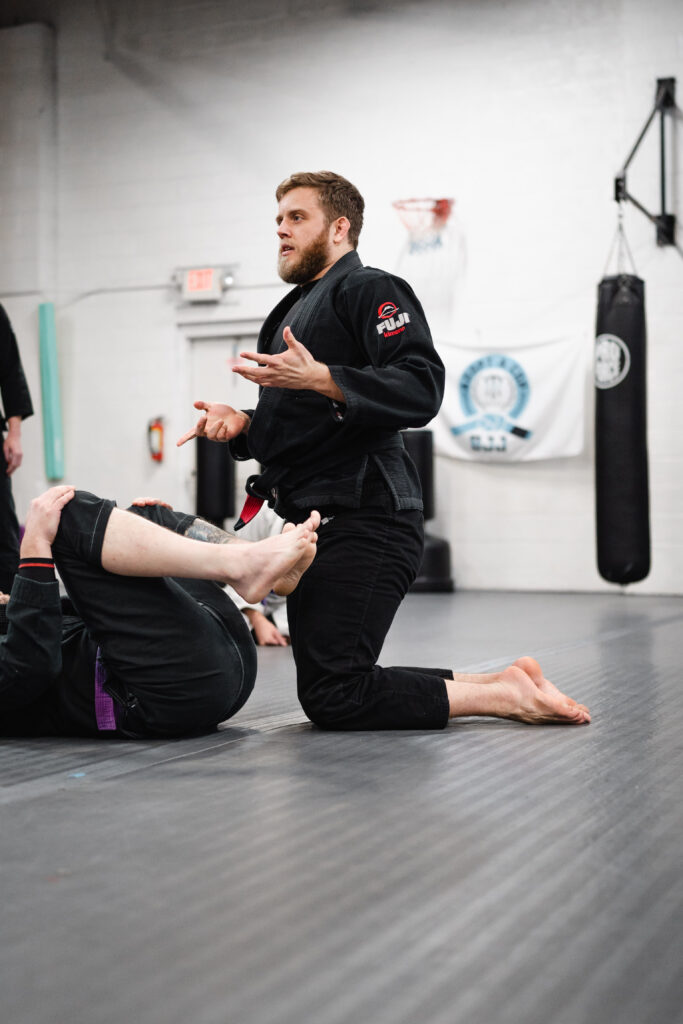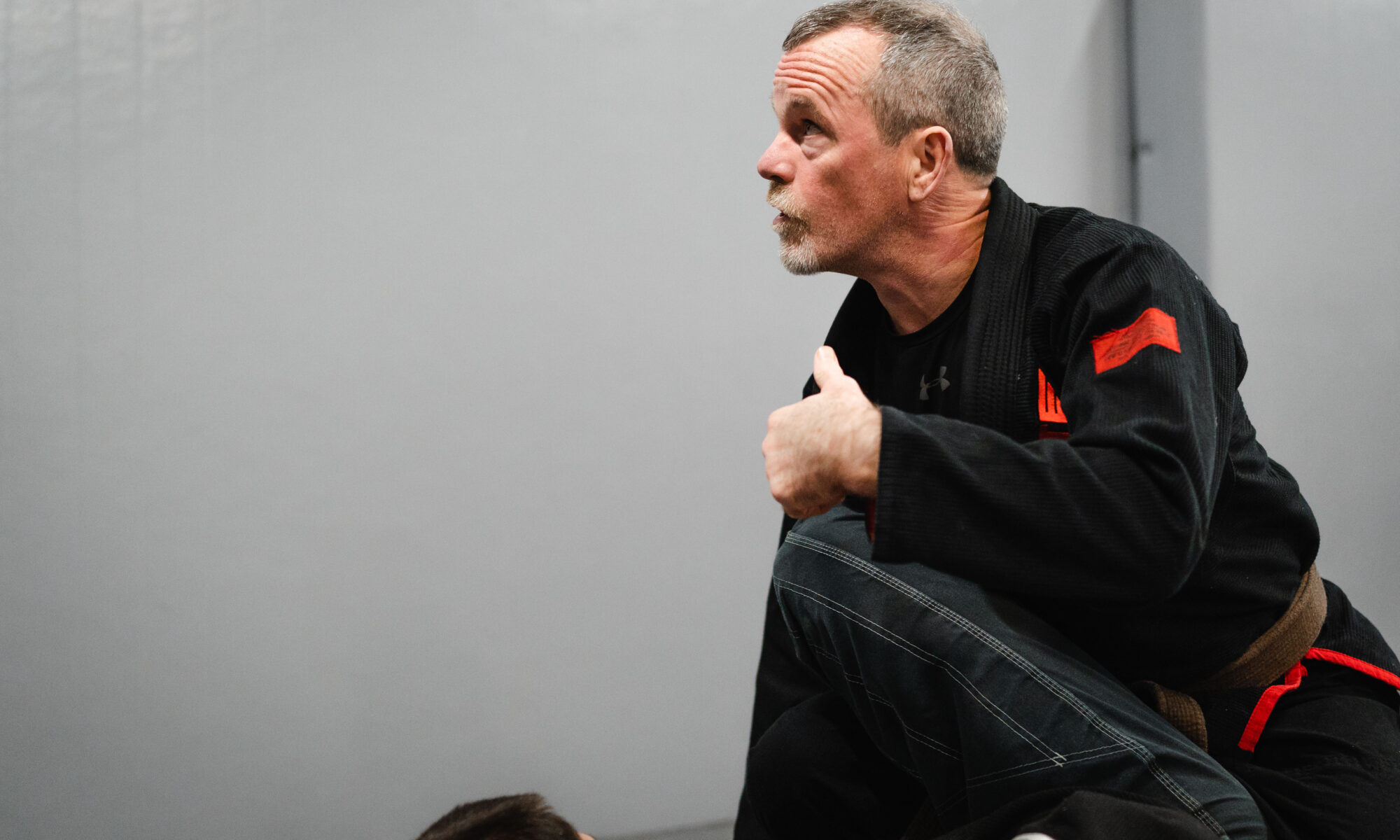Brazilian Jiu-Jitsu (BJJ) is a martial art that emphasizes ground fighting and submission holds. Some of the key principles that students learn in the Exton BJJ Classes include:
The classes at Exton BJJ are all about approachability and practicality. This comes from and understanding of the following principles.
- Control: In BJJ, it is important to control your opponent’s movements and positioning in order to effectively apply techniques.
- Leverage: BJJ utilizes leverage and body mechanics to overcome size and strength differences.
- Efficiency: BJJ techniques are designed to be efficient, using minimal energy to control and submit an opponent.
- Timing: Proper timing is crucial in BJJ, as it allows you to effectively execute techniques and counter your opponent’s moves.
- Strategy: Developing a game plan and adapting to your opponent’s strengths and weaknesses is an important aspect of BJJ.
- Relaxation: Maintaining a state of relaxation helps to conserve energy and increase endurance during grappling.
- Breath Control: Proper breathing can help to regulate your heart rate and oxygen levels, which is important for sustained physical activity.
- Respect: BJJ places a strong emphasis on mutual respect and discipline, both on and off the mat.

Control
For practitioners of Brazilian Jiu-Jitsu (BJJ), controlling your opponent’s movements and positioning is essential for developing your technique. By gaining superior positional control, you are able to combine specific techniques and apply them with maximum effectiveness.
Controlling your opponent also creates opportunities for submissions, sweeps, and passing the guard. Taking a more active approach can also prevent your opponent from attempting their own moves or escaping the clinch. Ultimately, gaining control over your opponent’s movements gives you the upper hand and positions you to dictate the flow of the match.
Leverage
Brazilian Jiu-Jitsu (BJJ) focuses on using leverage and body mechanics to give smaller practitioners the advantage. By understanding how the human body works and learning to manipulate your opponent’s joints, it’s possible to create pressure and control even when faced with size and strength differences.
This is done by using joint locks, chokes, escapes, reversals, guard passes, sweeps, pins and other techniques that rely on proper body positioning. Proper mechanics such as weight distribution, balance, pressure points along with the correct use of leverage allows a smaller fighter to overcome an opponent who may possess more raw strength or endurance. BJJ can be a powerful tool for overcoming physical limitations! At Exton BJJ, you’ll often see smaller students (both male and female) successfully rolling against larger students, because they understand this principle.
Efficiency
Brazilian Jiu-Jitsu techniques are designed to be efficient and effective. BJJ techniques take into account the body’s natural tendencies, combining footing, weight distribution and balance in order to gain an advantage. The goal of these techniques is to outsmart and control your opponent with minimal effort or energy expenditure.
By using leverage and pain compliance, it’s possible to create openings while avoiding direct confrontation with a stronger or larger opponent. Whether you’re looking for submission holds, guard passes, sweeps or other effective moves, learning how to use BJJ efficiently will give you an edge.
Timing
Proper timing is crucial in Brazilian Jiu-Jitsu because it allows practitioners to capitalize on positions and create openings for submission holds or other techniques. Timing is key when it comes to transitions, transitions from one move to another, and escapes from holds. A split second can mean the difference between an effective technique and one that fails. By learning the importance of timing, BJJ practitioners can remain two steps ahead of their opponents and gain the advantage.
Strategy
Developing a game plan and adapting to your opponent’s strengths and weaknesses is an integral part of Brazilian Jiu-Jitsu. While BJJ techniques are designed to be effective, they must be adapted to the individual variation in size, strength, skill level, and strategy of each opponent. By studying techniques, studying the opponent’s style, and making adjustments accordingly, BJJ practitioners can gain a competitive edge.
Developing an effective game plan that capitalizes on your opponent’s weaknesses while avoiding their strengths will ultimately give you the best chance of victory. An adaptable approach when it comes to technique will not only help you win matches but will also take your BJJ skills to the next level.
Relaxation
During grappling, maintaining a state of relaxation is key to conserving energy and increasing endurance. Relaxation helps keep the muscles from becoming tense and strained, reducing fatigue and allowing for greater precision in techniques. By staying relaxed and breathing deeply, grapplers can reduce the amount of stress their bodies undergo during physical exertion, resulting in better recovery times between rounds.
Relaxation also allows the practitioner to remain focused on technique rather than overworking the body, helping to conserve energy and increase endurance for longer matches or tournaments.
Breath Control
Proper breathing plays a crucial role in regulating heart rate and oxygen levels, which is important for sustained physical activity. When we breathe deeply and fully, we are able to oxygenate our blood and muscles more efficiently, which helps to keep our heart rate in a healthy range. In addition, deep breathing helps to reduce stress and anxiety, which can cause our heart rate to spike and our muscles to tense up.
This can make it harder to sustain physical activity, especially if we’re already feeling fatigued. By focusing on deep, slow breaths and maintaining a steady rhythm, we can help to regulate our heart rate and oxygen levels, allowing us to maintain physical activity for longer periods of time. When you start training at Exton BJJ you’ll see how physically demanding Jiu Jitsu can be. However, it’s one of the best ways to improve your cardiovascular health.
Respect
Brazilian Jiu-Jitsu (BJJ) is a martial art that places a strong emphasis on mutual respect and discipline, both on and off the mat. BJJ practitioners are taught to respect their opponents, their training partners, and themselves. This respect is shown in the way that practitioners conduct themselves on the mat, as well as in the way they interact with others. On the mat, BJJ practitioners are expected to use their skills and techniques safely and ethically, and to always control their emotions and behavior. This includes following the rules of the academy, being punctual to class and always arrive prepared.
Off the mat, BJJ practitioners are expected to be respectful and disciplined in all aspects of their lives. This includes being honest, reliable, and dependable, as well as treating others with kindness and consideration. BJJ also teaches the importance of self-discipline and self-control, which can help practitioners to overcome challenges and obstacles in their lives. By placing a strong emphasis on mutual respect and discipline, BJJ not only helps practitioners to improve their physical and technical skills, but also helps them to develop as individuals and to become better, more responsible members of their communities.


